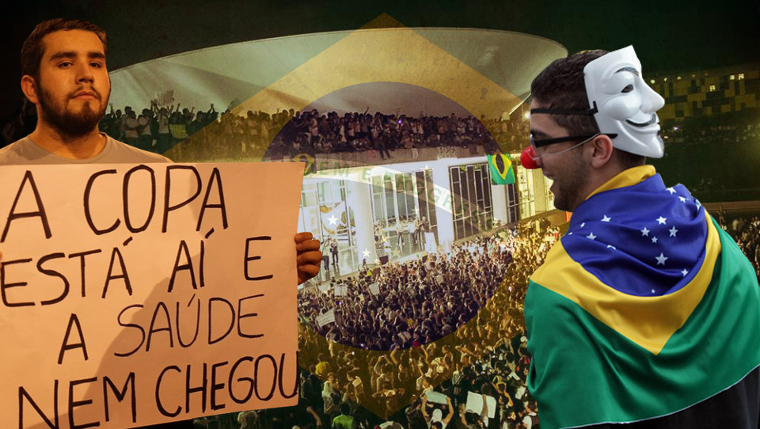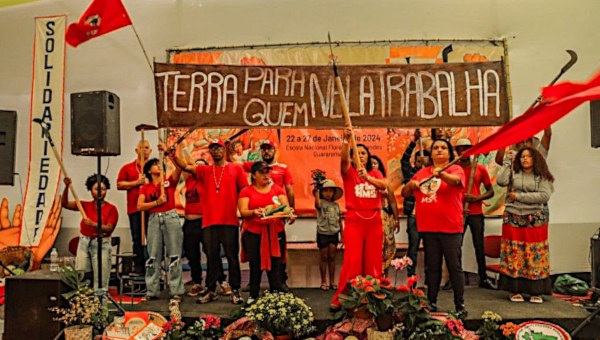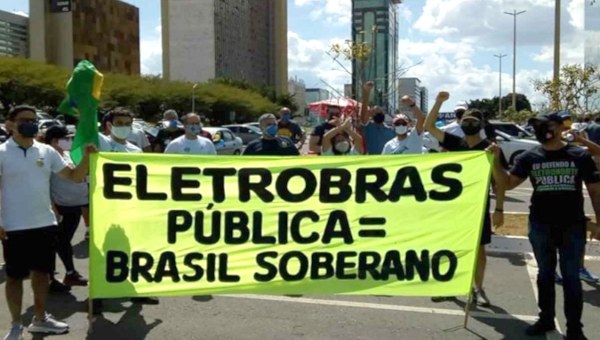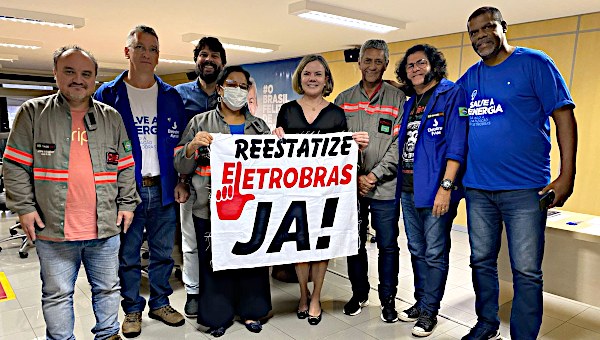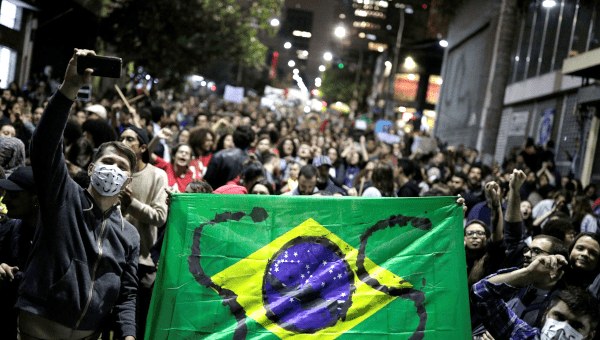“Nothing should seem natural. Nothing should seem impossible to change.”
— Bertolt Brecht.
Brazil is not an easy country to understand. Over the past 20 years, despite the apparent changes in the relationship between state and society, there has not been in fact a substantial disruption in economic, social, and policy structures.
The rise of the Workers’ Party (Partido dos Trabalhadores, PT) and its election in 2002 have created an expectation of great changes in the political direction of Brazil. However, despite the criticism of the economic model and the immense debt to the poorest sectors of the population, after the election, the Workers’ Party proved that it was as pragmatic as its predecessors: it tried to ensure “good governance,” i.e. the support of Parliament and its continuation in power.

In Brazil, despite the presidential system, the Executive Power has always depended on votes from the Parliament to guarantee the implementation of its
projects. Without a majority in Parliament, no president can govern without making deals with Congress. Without these deals, there is no
guarantee that any governmental measure can be implemented. As Parliament is for the most part conservative, many legislators would only commit themselves to support the Executive initiatives upon the release of funds for their regions and projects. And this almost always involves shady transactions and embezzlement on the part of these legislators.
All previous governments followed these paths in order to ensure parliamentary support to public policies established by the Executive through the distribution of funds. This is called “buying the deputies.” And in practice it means buying parliamentary support upon the release of funds, often very substantial.
Brazilian Realpolitik
With the PT (Workers’ Party) it was not different. In order to ensure the continuity of government and the approval of its projects, the PT also played the game of parliamentarians, which eventually led to the involvement of the party in large deals, discovered two years after the inauguration of President Lula da Silva. But, according to some members of the party, this practice was the only way to govern on account of the conservatism of institutions and elites: Realpolitik. The exposure of these practices led to the first economic crisis and to the reduction of support for the party, especially among the middle strata of the population and public sector workers.
As a result, the Workers’ Party missed a great opportunity to make reforms in Brazilian political institutions and to ensure profound changes in the relationship between state and society. These were the proposals that made the PT different from the other political parties before reaching power. With the support it had in the early days of government, the PT could have withstood any pressure from the Congress to avoid changes. By giving up the expectations of society and, in particular, of its electorate to implement political and institutional changes, the PT simply turned into a party like the others. Currently this is widely understood by the masses.
But the great popularity of President Lula made his reelection possible and the election of his candidate, Dilma Rousseff. To ensure a solid electoral base the PT has developed a set of compensatory policies that affected mainly the poorest sectors of the population. By implementing programs that guarantee minimum income and a certain amount for families to obtain at least basic food to save its members from hunger, or to rise above the poverty line, the PT secured the support of the poorest segments of the population. Since the implementation of these policies, it is this segment which represents the largest numbers of the party voters.
However, this segment of Brazilian society has not changed its social status. In addition to receiving money or food, the only condition for continuing to qualify for some money is to maintain a low income and keep children in school. Thus, there has been no substantial change for these segments, except an improvement in the quality of their food. With this, the PT seeks to demonstrate that its policies lead to the eradication of poverty, but also (and especially) ensure a faithful electorate among the needy and the subsequent harnessing of this constituency to the party, even though the crisis reaches other social groups. And this is the crisis that the Workers’ Party is facing at this moment.
Neoliberal Doctrine and Spending on Credit
In the last 10 years, a portion of the population still employed saw their purchasing power grow to the point of being able to reach a level of consumption never experienced before. But this was not the result of higher salaries but the result of a policy of popularization of credit, both for home ownership as well as for durable and non-durable products. Not only did this growth of the credit market result in a substantial increase of the internal market, it also created an alarming debtload for this poor sector of the population who had much of their income committed to the consumption of goods through easy and cheap credit. As a result, the rate of default on these credit loans has increased while the domestic consumer market has decreased. This lowering of the purchasing power is one of the factors that drove the population to express their dissatisfaction.
Similar to previous governments, the PT followed the neoliberal doctrine, i.e., it kept cutting and taxing pensions, eliminating public services, privatizing state corporations and deepening the internationalization of the Brazilian economy. This was one of the factors that triggered the crisis, because the cuts in public spending resulting from these policies were not sufficient to ensure social investments.
The large and numerous demonstrations in the streets of big Brazilian cities (which had expanded to the medium and small cities) which occurred in recent months did not have the federal government as their main target, but rather the poor quality of public services (scrapped by past governments) and the modus operandi of Brazilian politics. In this sense the demonstrations affect the PT, which did not establish any new political practice, and also all the other parties, whether in the coalition supporting the government or the opposition. Therefore, all parties have lost credibility in Brazilian public opinion due to shady practices.
Faced with a deep global economic crisis which substantially reduces the value of exports and is tied to conservative parties with which it made alliances to ensure good governance, the PT lost the flexibility and ability to respond to the movements that grow every day in the country.
Such movements, reflecting people’s frustration with the direction of society and the limits of the economic and social development of the country, did not just start now. The strikes emerged two years ago in all parts of the country: teachers, firefighters, police, doctors, bus drivers, transit workers, etc. While these segments were fighting for better wages and working conditions and were experiencing dissatisfaction with the care provided by the Brazilian state to the poorest, the state and development banks1 continued to finance the privatization of the productive structures and the consolidation of large national and international fortunes.
Civil Society
Unlike countries where the “Arab Spring” occurred, Brazil is a country in which, since the nineteenth century, there is already a civil society composed of unions, associations, clubs and all sorts of groupings by category, neighborhood or affinity of objectives which established itself throughout the twentieth century. It is therefore a state whose institutional building dates back to the nineteenth century and whose civil society has achieved a high level of advanced and sophisticated organization.
Even during the period between the 1960s and ‘80s of the twentieth century when the Brazilian state was ruled by the military,2 where all forms of social organization were attacked by the repressive apparatus, such associations remained alive, some operating and acting within the spaces allowed by authoritarian governments. However, with the political opening that occurred during the 1980s, such organizations have lost their importance, and became increasingly so linked to the State as to drastically reduce their representation. The culmination of this process occurred precisely in the last 30 years: with the neoliberal model came the reduction of the labour market and the number of workers formally employed, thus shrinking the power of the unions and associations.
The final blow to the network of class representation was given by the Lula government to subordinate the unions to favours and interests of the federal government. Thus, what was left was a network of trade unions and labour federations with little or no representation with a reduced number of members in their categories or social groups, heavily dependent on state funding and with little or no ability to lead and drive social movements. This fact can be confirmed by the small popular participation in demonstrations called by unions, compared with the demonstrations called by groups that emerged from the protests themselves, as the MPL (Free Pass Movement) in recent months. All these factors have not prevented the emergence of the latest protests, but demonstrated that the old forms of organization did not produce or led movements, pointing to new spaces of articulation as well as for new leaders, whose origins and references are not in the old unions and the grassroots organizations.
Mobilizations that occurred in recent weeks in Brazilian cities advocated for immediate issues such as wage increases, reduction in the price and improvement in the quality of transportation, qualified medical care, public education, etc. The demonstrations advocate funding for improvements in these sectors, but have not yet increased their understanding of the mechanisms that determine the allocation of the budgets. The movement has not yet turned its attention to the crucial questions which prevent the state from guaranteeing greater social investments. Such issues are the public debt and the policies of interest rate increases which result in greater state debt, preventing much of the budget to be used for services to the population. Thus, such mobilizations work against the populist welfare state model implemented in the last 10 years, but still do not point to the big questions that ensure a high level of concentration of income in a country considered a “developing” country. And there is no way of knowing whether the mobilizations will take this issue forward.
It is also impossible to define the type of organization that will emerge from these movements to replace the current representations worn out by the interference and by dependence to the state. The crisis consists precisely in the fact that the old dies and the new is not able to be born.3 Paramilitary groups, flags and fascist slogans have been detected in the demonstrations and social networks. The connection of some of these groups with state agents has just been proven through photos and movies, but the fact is that at this context there is room for the emergence and articulation of such groups.
The disappointment toward parties and institutions is not new at times like this. In the 1930s there was a similar process and we all know what happened.
All of this is unknown, but it is certain that Brazil will no longer be the same after these events. •
